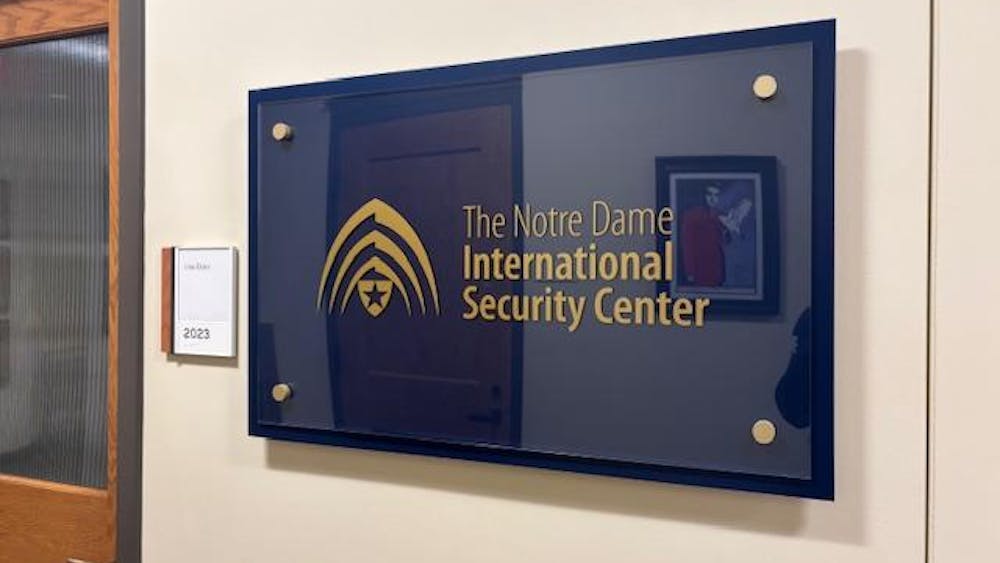The one-credit course “Israel, Palestine and What We Owe Each Other,” designed by professors Mahan Mirza and Tzvi Novick, seeks to educate students on the complexities of the Israel-Palestine conflict.
Now in its second iteration, the course adopts a narrative approach towards the conflict, shedding light on both Israeli and Palestinian perspectives. The course aims to foster understanding without necessarily advocating for a specific resolution.
“It’s not to change their minds about how they view the conflict. It’s not to water down the terrible things that are happening right now,” Mirza said. ”But it tries to provide that historical perspective, of not just one side, but both sides, in so far as you know, that each side is also internally complicated.”
The course was developed as a part of a broader initiative to address pressing global challenges within the university setting. Amid campus protests and heightened attention to the Israeli-Palestine conflict, provost John McGreevy tasked Mirza and Novick to create a space for meaningful yet respectful dialogue.
“We want the disagreement between the narratives to be present in our conversation, in our forums, in the classroom, and the best argument from both to be platform, rather than just straw manning one side or the other,” Mirza said.
The course is built around three main components: weekly readings and discussions, dialogues with Israeli and Palestinian students and attendance at public forums and lectures.
At the heart of these elements is a narrative-based approach. Rather than focusing on memorizing historical facts and chronology of history, the course delves into the lived experiences of those directly involved.
When asked about the choice to formulate the course in this way, both Mirza and Novick emphasized the importance of comprehending that, at its core, the conflict is a story of human lives.
Novick, whose primary field of study is Christianity and Judaism in antiquity, advocated for the narrative-based approach.
“It’s not just a matter of personalizing abstract ideas, but for me, it’s also important because it compels you to think of the actors on both sides as people with real comprehensible motives,” Novick said. ”It forecloses a kind of tendency to demonize or to dehumanize the other side.”
This emphasis on personal narrative is reflected in the course’s choice of literature. Last semester, students read ”Lemon Tree” by Sandy Tolan, an account that intertwines the lives of a Palestinian man and an Israeli woman.
“The course is about the ability to see those two stories and to hold them together, not say it’s one or the other?” Mirza said.
When asked about the course’s intended impact on students, Novick highlighted the course’s goal of bringing about a nuanced understanding of the matter, encouraging students to engage with its complexities while appreciating the human experience present on both sides.
“We’re not trying to change anyone’s minds, but they’re able to see it fuller and bigger than they were able to see before,” Mirza said. “We’re creating a space for literacy, not necessarily for advocacy, although there’s a subtle difference between the two.”
One of the course’s most striking features is the collaboration between Novick, an Orthodox Jew and Zionist, and Mirza, a Muslim scholar and practitioner of the Islamic faith. Their differing backgrounds and perspectives mirror the complexities and intricacies of the conflict itself.
“Symbolically, it was important to have a Jewish and a Muslim convener for this forum,” Mirza said.
Tess Jacob, a senior majoring in global affairs and minoring in business, also appreciated this balance.
“I really liked how the class was taught from a dual narrative perspective. It’s allowed me to build a more nuanced perspective in the conflict,” Jacob said.
Taylor Thigpen, a freshman studying global affairs, reflected on the broader implications of the course.
“I don’t need to pick a side, that’s what I learned. It’s less about picking a side and more about helping people who are hurting,” Thigpen said.
Max Kitchell, another freshman in the course, echoed this sentiment. Kitchell highlighted the importance of the narrative-based approach in making the conflict approachable and personal.
“Story matters so much to conflict,” he said.
He also reflected on the misconceptions he and other students entered the course with and how those have since been altered.
“A misconception that I either hear talking to students or that I brought as a student to the class, is that this is a 1,000-year conflict, that is unsolvable, that this is hopeless. Yeah, it’s not,” Kitchell said. “It’s a discrete conflict that started 150 years ago. There’s a lot that went into it, and there’s injustice on both sides. All that’s true, it’s complicated, but I don’t think it’s unsolvable.”
He then emphasized the importance of engaging in courses like this.
“It’s important for academics to be studying and thinking about this. It’s important for us to think about, to dream about,” he said.
For Kitchell, the course’s takeaway is simple but powerful. He asks students to “Just have a mind about it, just think about it.”
This emphasis on thoughtful engagement and understanding underscores the course’s broader mission: to help students grapple with the complexities of the conflict while appreciating its historical foundations.
“History didn’t begin with Oct. 7. It led to Oct. 7,” Mirza said.










